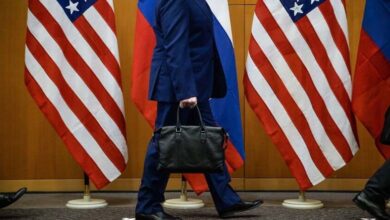Blinken in Middle East tour to discuss Gaza ceasefire
US Secretary of State acknowledges that all Gaza residents suffer from high levels of acute food insecurity

Secretary of State Antony Blinken is visiting Saudi Arabia and Egypt this week to discuss efforts to secure a ceasefire agreement in Gaza and increase humanitarian aid entry into the sector, a US State Department spokesperson announced Tuesday. This comes as Washington pressures Israeli Prime Minister Benjamin Netanyahu to prevent an attack on Rafah.
Matthew Miller from the Philippines, visited by Blinken, stated that the US Secretary of State will hold talks with Saudi leaders in Jeddah on Wednesday before moving to Cairo on Thursday to meet with Egyptian officials amidst negotiations in Doha for a hostage swap deal between Israel and Hamas.
This will be Blinken‘s sixth tour in the Middle East since the outbreak of war between Israel and Hamas on October 7th.
Miller emphasized in a statement that Blinken “will discuss efforts to reach an immediate ceasefire agreement, ensuring the release of all remaining hostages, intensifying international efforts to increase humanitarian aid to Gaza, and coordinating planning for the post-conflict phase in Gaza, including ensuring that Hamas cannot govern or repeat attacks on October 7th.”
The US Secretary of State also stated that all Gaza residents suffer from “high levels of acute food insecurity,” emphasizing the urgent need to increase humanitarian aid delivery to the Palestinian territory.
He added that “by most reliable standards, 100% of Gaza’s population suffers from high levels of acute food insecurity. This is the first time an entire population has been classified in this way.” He will also discuss “a political path for the Palestinian people with security assurances with Israel, and a framework for permanent peace and security in the region,” according to the statement.
Israel has stated that it will attempt to “flood” Gaza with humanitarian aid from several entry points as international pressure mounts to address the escalating hunger crisis in the besieged sector, but the United States has warned the Jewish state of the repercussions of an incursion into Rafah.
It will also raise the inevitable issue of ending Houthi rebel attacks in Yemen on merchant ships, to restore stability and security in the Red Sea and the Gulf of Aden, according to Miller.
On February 16th, the US designation of the Houthi group as an “international terrorist organization” came into effect in response to its attacks in the Red Sea, according to the US State Department.
“In solidarity with Gaza,” facing a devastating Israeli war with US support, the Houthis target Israeli cargo ships or those affiliated with them in the Red Sea with missiles and drones.
Since the beginning of this year, the “Guardians of Flowers” coalition led by the United States has been conducting airstrikes it says target “Houthi sites” in various areas of Yemen, in response to their attacks in the Red Sea, which has occasionally been met with retaliation from the group.
With Washington and London intervening and tension escalating in January, the Houthi group announced that it now considers all US and British ships as part of its military targets.












